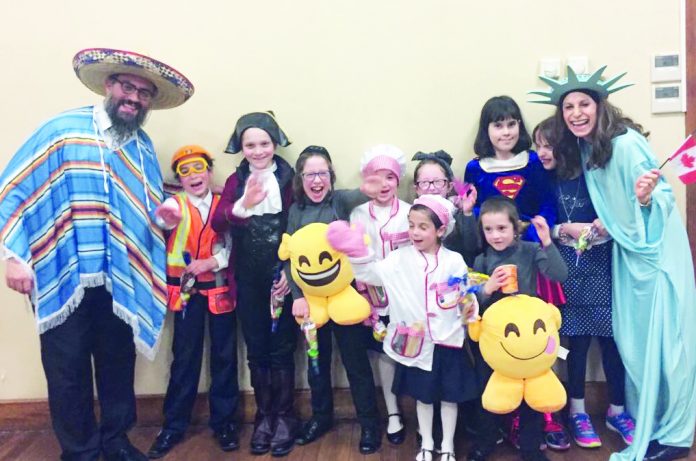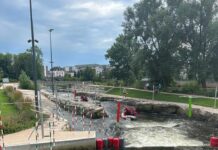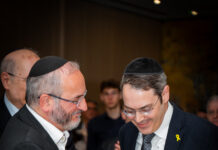
By David Saffer
It is not an easy task evaluating how or why a Jewish community becomes established – especially over a century ago – but in the case of Southend & Westcliff Hebrew Congregation it could well come down to the seaside town being an ideal location for a healthy lifestyle.
Certainly, in the late 19th century London doctors advised patients, particularly in the East End, that Southend-on-Sea offered a welcome relief to the harsh realities of life in the capital city.
Whether that was actually the reason Jewish people were first recorded in the 1881 census is pure conjecture. But mother and daughter Reyna and Eleanor Cohen ran a lodging house, and that is a fact.
The Cohens might have stumbled on the town by chance or escaped the pogroms in central Europe or Russia, but whatever the reason, Jews had begun life by the sea.
Jewish tailor Maurice Cohen advertised his business in 1894 in the Southend Standard and was still advertising his services by the turn of the century when his eldest daughter, Sadie, was photographed waving a Union Jack flag in a fundraising bid for the Boer War (1899-1902), which brought thanks from the mayor of the seaside resort.
Services for Jewish residents initially took place at the home of a member in the town and then a public hall for High Holidays.
Members even utilised a shed, then briefly rented a disused chapel in Station Road, before a plot of land was purchased and partly paid for in Alexander Road, although a financial appeal to the community initially brought insufficient funds.
The ladies guild was set up in 1904, and Southend & Westcliff Hebrew Congregation was formally established two years later.
Sadie was officially the shul’s first Jewish bride when she married Alfred Burns on 3 January 1907 at the Masonic Hall in the High Street.
Rabbi Hast, first reader at the Great Synagogue of the East End in London, officiated, and members gave Sadie an inscribed set of candlesticks to mark the landmark occasion.
The congregation went on to overcome various challenges before the first purpose-built shul in Alexandra Road was finally built in 1912.
A year earlier, the Jewish Year Book identified 101 members. In 1916 there were 145 seat holders and by the 1930s the congregation had 300 families plus 60 children attending a cheder.
Historians have recorded a number of influential shul members for their deeds down the years.
Rev J Azulay saw a job advertised in 1924 and went on to serve the community as mohel, shochet, headmaster of the cheder and head of the Chevrah Kadishah.
Joseph Novitsky was a founder member of the synagogue, served as treasurer, was a town councillor, and opened the first kosher hotel in Westcliff, The Novitt Hotel.
Other hoteliers included Mrs Koral who ran Trocadero, The Leas Jewish boarding establishment on the sea front, and Sam Nechomkin, who owned the Northfield Road Kosher boarding establishment.
Then there was Rev Aaron Plaskow, who was minister of the congregation from 1924 till his retirement in 1950.
And whilst in its formative years, teens attended a study group, Habonim (Gedud Zionah), the Young Zionist Society and Hebrew classes. Purim and Chanukah shows were also the norm.
The Southend Association of Jewish Youth was formed in 1939, but the group waned as members joined up at the onset of World War Two.
Over the coming two decades, as the number of members grew, various satellite minyanim were set up.
Rabbi Pinchas Shebson served the congregation for 25 years from the 1950s and was instrumental in raising funds to establish the current shul building on Finchley Road, Westcliff, which opened in 1968.
By the 1980s, some 1500 families were registered as members.
In more recent history, former Chief Rabbi, Lord Jonathan Sacks, and other well-known dignitaries joined Centenary celebrations to mark 100 years of the congregation in May 2006.
The same year, Rabbi Binyamin Bar took up his present post and the Chief Rabbi returned within 12 months to lead Rabbi Bar’s induction.
Another red-letter day came when the Jewish community held a street party parade to welcome two new sifrei Torah sponsored by the congregation in May 2010.
All satellite minyanim had been integrated back into the main shul by 2013.
Rabbi Bar began his rabbinic sojourn across the English Channel.
“We can trace our family back to the Rivash, one of the early halachic authorities in Spain then Algiers,” he explained. “We come after him, son after son.
“My father, Rabbi Choviv Bar Sheshet, was a community-orientated person, well appreciated, and gave many shiurim in Strasbourg, France.
“I studied at Chabad yeshivot, which gave great emphasis on outreach, so I learnt a lot from those experiences. We were raised with the philosophy to look after every Jewish person for who they are and what they can become. That notion has stayed with me.
“My passion has always been learning and writing; even now, whilst being a rabbi, I put aside two days a week so I can learn at a northwest London Kollel.”
So how did Rabbi Bar, who is married to Chaya Faigy and has two children, arrive at Southend & Westcliff Hebrew Congregation?
After gaining semichah, Rabbi Bar studied and taught at a yeshivah in Montreal, prior to moving to London in 2006.
It was not long before he landed his first, and to date only, post in the United Kingdom.
“The shul was looking for a minister after Rabbi Mendel Lew went to Stanmore and Canons Park Synagogue in March 2006,” he recalled. “The Shabbat after Rabbi Lew left, someone got in touch with me so I agreed to go temporarily. I was asked to apply and the rest as they say is history.”
In terms of his congregants, Rabbi Bar has a clear vision but is well aware of the challenges they face in the 21st Century.
“My great desire is to build the Jewish community,” he said.
“It’s our community and I want to make the best of its future, but we realise that with a lot of local families, children have moved on and decided to stay in London.
“This has been a trend, but there are families interested in relocating to our area because it has a great quality of life with an excellent infrastructure.
“People want to go back and forth to London so we can build a future for the community.”
The Jewish community has been bolstered by a number of charedi families in recent years, which Rabbi Bar has welcomed and encouraged.
And he wants to attract more modern Orthodox families to the area.
“I’ve been behind this trend since day one and we have many plans in the pipeline,” he enthused.
“We are working on an eruv and beginning a small kollel to attract modern Orthodox families.
“It is essential to make sure there is something for everyone, so people of all observance levels can feel comfortable in our community. That is the aim and there are projects. Some will take longer than others but they are coming together slowly but surely.
“It’s an exciting time. Only recently we had a bris for one of the families that has just moved here. The whole community was invited and it was a really nice simchah.”
He added, “For many years we were running the only minyan in a 30-mile radius, but now Canvey Island, which is only 30 minutes away, has a charedi Jewish community. There is a yeshivah, which was in Lucerne, Switzerland. We have connected and it’s a positive relationship.”
The Jewish community currently stands at around 4,000 people, and 650 families are members of the shul.
Shabbat services average 100 people with more on special occasions.
The shul has an active ladies guild, care organisation and functions committee.
Another popular facility is The Shop, based in the Talmud Torah, offering kosher products.
Shoppers can buy delicatessen items plus a large selection of dry goods. Items not in stock can be ordered for collection the following week.
To expand kosher facilities in the town, local charedi newcomers are about to open a delicatessen this year.
The wider community has numerous Jewish organisations but a key element for future progress is educational activities through the shul.
And Rabbi Bar is not afraid to experiment in terms of topics to draw in the crowds.
“Our programmes attract different numbers and I always look for novel ideas to interest people to get them involved with the community,” he explained.
“When topics are not typical more people come, so we hold women-only events and discussions in people’s homes, and supper ‘n’ learning nights have evolved over the years.
“There is a real interest to learn, which is why we would like to see the establishment of a kollel as it would offer a huge amount to the community.”
Clearly, gone are the days when Rabbi Bar was the main font of Jewish knowledge in town.
“The charedim who have come have been really helpful,” enthused Rabbi Bar. “They have invited people over, become friendly with them and are doing really good work.”
A hit locally, which has attracted attention, is the sole mikvah the area. Originally opened in 1960, it was fully refurbished in 2013.
Rabbi Bar facilitated the rebuilding of the mikvah to the highest halachic standards.
“In my opinion, it has attracted people to the area,” he explained.
“People all around the county use the mikvah. It’s very busy so I’m thrilled that after all the effort it’s being used every evening.”
Looking to the future, he noted, “We do have a high percentage of retired people in our community but young families are coming as they want good value in terms of housing.
“They are happy to commute to London so it’s really positive.
“The biggest challenge is to keep up our efforts in rejuvenating an increase in religious observance and vibrancy of existing members,” he said.
“What is unique to the congregation is that we have always been one community. There has never been two shuls and we cover the spectrum of observance levels.
“Bringing everyone together under one roof is a challenge but it’s one that is very important to me.
“We have a main service and another for the charedim if they have enough for a minyan.
“We must stay united, even if we have to have different services. We must stick together and give members what they need for their style of Jewish life.”
Rabbi Bar added, “Living by the sea is amazing. You can enjoy the sea air, we are commutable to London and it’s a great pace of life.
“The community is unique in the sense that it has embraced many different people and is very respectful, warm and welcoming. We look forward to welcoming more families.”









